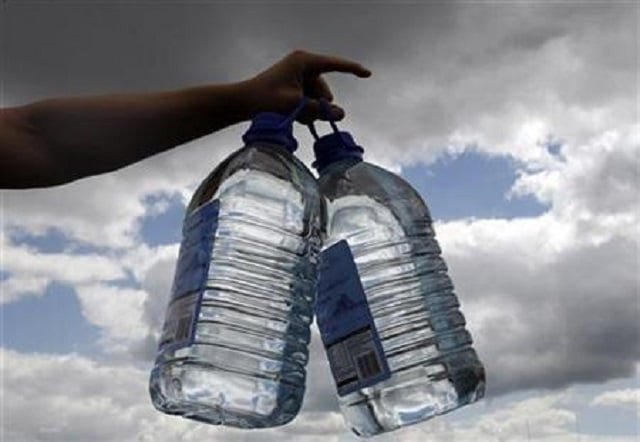Microbial contamination of drinking water in Islamabad has intensified, claims report
'Since 2,000 till date no improvement has been witnessed in water quality of the capital city'

PHOTO: REUTERS / FILE
Since 2,000 till date no improvement has been witnessed in the water quality of Islamabad, according to the results of latest water quality analysis of major cities of Pakistan-2015-16.
The report compiled by Pakistan Council of Research in Water Resources (PCRWR) –a copy of which is available with The Express Tribune -- reveals that 68% water sources were found unfit for drinking purpose in Islamabad and 62% in Rawalpindi. Water quality of Rawalpindi city has been found better and improved then of Islamabad.
A total of 25 predetermined locations were monitored for the drinking water quality of Islamabad, out of them 17 sources were found unfit for drinking purpose.
The major contaminant found in the drinking water was bacteria, as 68% of the water samples were found contaminated with Coliforms. However the surface run-off, increased concentrations of nutrients and municipal waste are major contributing sources for higher bacterial contamination in drinking water, according to the report.
When contacted Capital Development Authority (CDA) spokesperson Mazhar Hussian, he said, that CDA is making all out efforts to ensure provision of clean drinking water to the residents of the capital.
He said that around 37 filtration plants are installed at different locations in the capital meanwhile water purification plant is installed at Simly Dam in order to provide clean drinking water to the people of Islamabad.
Rawalpindi
According to PCRWR the water samples from Rawalpindi were collected from 13 sources, out of 15 predetermined locations, two were found non-functional and eight sources which is around 62% were found unsafe for drinking purpose. The major contaminants were nitrate and bacteria as 23% samples were found contaminated with high level of nitrate, whereas 46% of the water samples were found contaminated with bacteria.
The report further shows a significant improvement in the water quality of Rawalpindi city since 2002 as safe water sources has increased from 27% in 2002 to 43% in 2016.
While commenting on the consumption of contaminated water for drinking purpose, a senior gastroenterologist, Dr Waseem Khawaja, working at Pakistan Institute of Medical Sciences (Pims), said, “no-doubt there has been a significant increase in the number of people suffering from water-borne diseases in Islamabad.”
He said that majority of the people, who visits hospitals are suffering from diarrhoea, hepatitis –A, E, typhoid, gastroenteritis, stomach ache, cholera among others.
“This year, since June over 50,000 patients suffering from water-borne disease were treated alone in the emergency department of the hospital,” he said.
Dr Khawaja further said that mostly people believe that mineral water is safe for drinking but they do not know that there are several brands are also contaminated.
On the other hand an official in the water sector who wished not to be named while expressing grave concern over poor quality of drinking water in Islamabad said, “It is shocking and surprising to see that the quality of drinking water in the capital city of Pakistan is unsafe than what should we say about the other cities of the country.”
He said that unfortunately improving water quality and its access is not on the priority list of the government.
“Several filtration plant installed in Islamabad are either non-functional or one could find them un-cleaned or unhygienic,” he said.
The city mangers get ample funds for proper disposal of municipal waste but no wonder where it goes, he said.
Published in The Express Tribune, September 24th, 2017.



















COMMENTS
Comments are moderated and generally will be posted if they are on-topic and not abusive.
For more information, please see our Comments FAQ